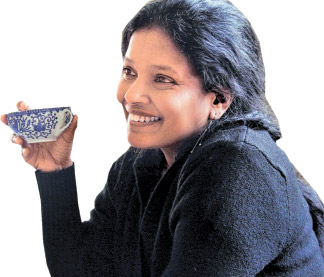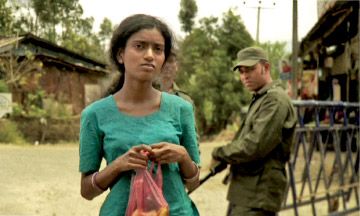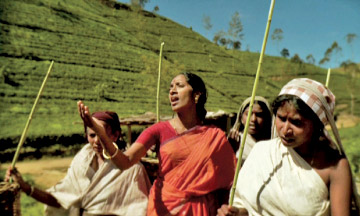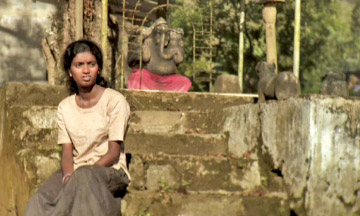|

Far above the ‘Form’!
Ruwini JAYAWARDANA
 |
|
Dr Sumathy
Sivamohan |
She believes in art as a desire of mediating change rather than a
direct tool of social reformation. Growing up in a fairly sheltered
conservative middle class background in Jaffna books were the doorway to
a wider world for her. The solitary of reading motivated her to think
differently that is now evident in her literary works.
Be it poetry, prose or the screen, her take is on the road less
traveled to life. She has ventured beyond convention to mould her
writing and productions.
Her research and academic involvement includes publications and
conference presentations on postcolonial literature and theory, women’s
movements in Sri Lanka, Performing Arts (theatre and film). She has won
the Gratiaen in 2001 for her play Thin Veils . A Washington State
University doctorate holder, she was a member of the Drama Panel of the
Arts Council of Sri Lanka and the member of Performing Arts Society in
Sri Lanka.
Ingirunthu (Here and Now), the latest addition to her collection of
artistic works, will be screened this year. Our ‘Encounter of the Week’
is the Head of English Department, University of Peradeniya, poet and
filmmaker Dr Sumathy Sivamohan.
Q: You are known as a poet, author, filmmaker or a lecture of
literature, critical theory, theatre and film theory. What comes for you
first?
A: They are like dreams: autobiographical, political and
philosophical. They appear like flashes of truth in a dream and I snatch
at what whizzes by in whatever colour in whatever form. If that is film,
then it might be poetry too. Who cares and who knows what it is all
about anyway? I need to tell and I tell how I can.
Q: Isn’t Ingirunthu more of a documentary than a film?
A: I can answer this at many levels. Let me try.
Firstly, the question you ask is about form.
What is the form of a documentary and what is that of feature? Could
you tell me what the formal features of a fiction feature are? This
cannot be defined at all, and should not be defined.
 I think in Sri Lanka there is no audience for documentaries and there
is no culture of watching and viewing documentaries. Individuals might
watch documentaries from around the world, but there is not much of a
documentary viewing/making culture here. I think in Sri Lanka there is no audience for documentaries and there
is no culture of watching and viewing documentaries. Individuals might
watch documentaries from around the world, but there is not much of a
documentary viewing/making culture here.
Ingirunthu is not a documentary if you apply the conventional
understanding of documentary; it does not attempt a ‘truth’ about a
situation. It does not demonstrate a truth. To the contrary, in my view,
it questions that understanding of truth. That’s how I would see your
question. When I was about to make Ingirunthu , I thought a lot about
its form, for I knew form would be crucial to this film. Form is crucial
to any film, but in a non linear film, form has to be thought over and
over.
In a linear film, form is shaped by the time line of the story. You
may get flashbacks and you may even have multiple narratives, but the
contents would still be shaped by the story, the narrative.
In linearity, form dominates and shapes the progression of the film
in such a way, it becomes naturalized; you do not raise questions about
form.
In the making of Ingirunthu I had to think deeply about form, not for
its own sake, but to develop a narrative, that is meaningful to the
people it is about, to myself, and to the audience. I had to then raise
questions about form and hence your question. I thought of Ingirunthu as
epic narration to draw upon Brechtian conception.
When a colleague of mine told me that Ingirunthu exemplified Brecht’s
concept of alienation, I was mighty pleased. But I was not thinking of
Brecht or any one else when I made the film. In fact I had Toni
Morrison’s Beloved , Moby Dick by Herman Melville and Ritwik Ghatak’s
trilogy, particularly Meghe Dhaka Tara , in mind when I thought of the
film.
I also had at the back of the mind, The Tree of the Wooden Clogs by
Olmi, a wonderful and deceptively simple narrative film. is not like any
of the above.
It is not like Moby Dick or Meghe Dhaka Tara . Neloufer de Mel did
see Esther Valli in Ingirunthu as the character ‘Beloved’ in Morrison’s
novel Beloved without any prompting from me.
 But formally speaking, Ingirunthu is very different from any of the
above. But formally speaking, Ingirunthu is very different from any of the
above.
To come back to documentary/fiction-feature dichotomy: I follow my
own train of thought and I developed a form that would capture the
urgency of the “Here and Now” of the people of the Malaiyaham, the
people of the tea plantation.
It is a film of “conversation” and I use the word conversation
metaphorically. It is about the conversations I had and continue to have
with my friends who are located in and outside of the ‘Malaiyaha’
community.
As I told you, I did not develop anything too consciously; but I knew
I was taking some risks. I wanted something that was immediate, urgent
and unplanned. I sought a documentary effect that would make a comment
on the idea of documentary as well. I used a free camera that would
capture things ‘as they are’, though they might have been more planned
than you would think. As you know I come from a theatre background and I
like to see what the actors bring to the stage or the situation here.
Oranges and even Piryalayam were heavily scripted documents. With
Ingirunthu , I tried not to control the actors too much and looked to
see how best the film could bring them out as people and not as actors.
I had the main idea which I gave the actors, and they improvised; after
which I delineated the situation and circumscribed the action, working
out until I got what I thought was the desired effect.
The actors were up to this. They were game. Even during shooting, I
sometimes let the situation develop to see how far I could go. Once you
think about form in this active sense, form becomes unimportant. You
would be free to play with it and with your material. You will take
control of the form and not let it dominate you. I like that play; the
crafting; the deep intellectuality; the fascination of seeing the risks
one takes pay off; the collaboration; the very semiotics of it.
Q: Your past films Oranges and Piralayam too include
autobiographical and real life details. Why do you prefer to make
productions based on true incidents rather than fiction?
A: Oranges uses archival material rather self consciously. The
archival material in Oranges disrupts the fiction part. Oranges is
autobiographical only in outline. The film itself is not
autobiographical. Piralayam situates the story within the tsunami. I
admire documentary films and documentary filmmakers; documentaries is
something I feel I cannot do. I feel I am not courageous enough to do
documentaries. There is something so unpredictable about documentaries.
I think I like to bring that fascination I have for documentaries into
my filmmaking.
 |
|
Scenes from
Ingirunthu |
Also, I use documentaries to disrupt the linearity of fictionalizing.
In Oranges I have both a naturalized bomb blast, a reconstruction and
archival material of bomb blasts. They give meaning to each other. But
Oranges is really a highly fictionalized work. The use of documentary
material is like a punctuating act; to create episodes and to create
another layer of meaning. One could say, that in Ingirunthu too, the
documentary effect produces different levels of meaning. But here, I am
speaking as a viewer, not as a filmmaker.
Q: What interested you about the plantation sector?
A: This necessitates a long answer. I will be slightly
enigmatic here. I live and work in Peradeniya and Kandy. It is important
for me to make sense of the histories that surround me; to make
conversation; understand the reality of being Sri Lankan.
Q: What was the biggest challenge you faced in making
Ingirunthu ?
A: Battling it out with the big plantation companies who
operate with a feudal-colonial understanding of territory.
Q: Do you believe that a work of art can change the mindset of
the society?
A: No. It can create spaces for discussion, a momentum, and a
desire. Maybe desire is the best word here, the desire to be an agent of
change. I expect little more from art. If it becomes a mass movement
then it can generate and shape desire, articulation, aspirations. But
individual works would not just by themselves change the mindset of
society.
Q: What is your view on Sri Lankan writing in English when
compared with English writing across the world?
A: When I read I do not compare. I read Sri Lankan writing, of
any language, only when I want to, when somebody tells me that a
particular work is exciting or worth reading; or when I know the writer.
So, I do not feel that somehow Sri Lankan literature needs to be propped
up, encouraged or anything like that.
For this reason, I must say, I am not an authority on Sri Lankan
literature in English.
However, if I could hazard an answer I’d say, today you find emerging
forms of writing in English that are far more exciting than those long
ago. The reasons for these are that there are more people writing in
English today than before.
And secondly, more and more writers are emerging from a bilingual and
who knows even trilingual environments, bringing in a more dynamic
idiom. Though in terms of quantity there might not be much to speak of,
there are flashes of brilliance in Sri Lankan writing in English.
Q: Do you see holding events such as the Gratiaen Award and
the Galle Literary Festival as an encouragement to budding young English
writers?
A: I hope not. I hope these elite formations do not become
defining moments for literary engagement. I hope literary engagement in
English is driven by a deep seated need to communicate, tell a story, to
write graffiti, etc. I am not somebody who thinks it is important for a
Sri Lankan English corpus. Why do we even speak of English literature in
Sri Lanka as an exclusive form? Why aren’t we speaking of it as
something that has to do with writing itself in any language?
Q: Are you satisfied with
the work done by university English departments and is there any room
for improvement?
A: If I may speak about Peradeniya English Department, which
is the only one I know best: there is something we do well. That is a
broad literary canon. Our students are given a good grounding in the
canonical, in critical thinking, in teaching language, and language
acquisition. What I’d like to see happen is more collaboration between
these three sections; Literature, language and critical theory- maybe
more of an engagement with other disciplines and research that goes
outside of analyzing texts. After you asked this question, I thought of
asking the students about it; it’d be interesting to find out what they
think.
Q:How has winning the
Premchand Fellowship 2011 helped you in your work?
A: I was of course thrilled to be awarded the fellowship about
which I knew little until I was called by the Indian Cultural Centre
Director Mr Ramachandran, who broke the news.
I was on my way to Norway for a performance. I was completely taken
aback. In India I was among some of the giants of literature and I felt
embarrassed and honoured at the same time about the award.
The writers I met were very sincere and dedicated people. What really
enchanted me was the interaction with writers from so many different
languages and all of them demanding attention in their own right.
I was at the Sahithya Akademi award ceremony and it was in the small
group interactions, one on one discussion that I found a lot of
understanding about what the writers were writing about.
I attended a conference on Dalit literature in Delhi which I found
very moving and thought provoking. Coming back to multilinguality: I was
asked again and again about the language I wrote in and when I said
English, I felt a certain sense of resistance. The unasked question:
‘why do you write in English?” I always felt obliged to add rather
hastily: “but my theatre and films are in Tamil,” I felt obliged to
justify my choice. I did not want to say, like many other writers
writing in English, “I have no choice, this is the language I know
best.” Could one really say, writing in English today, it is not a
choice? It is a choice, a choice of privilege. To say I write in English
because I have no choice, philosophically speaking, is not accurate. I
have a choice over not writing at all. I have a choice about wanting to
be a writer.
And that choice makes me a writer in English. I thought a lot about
my own location as a writer. |







